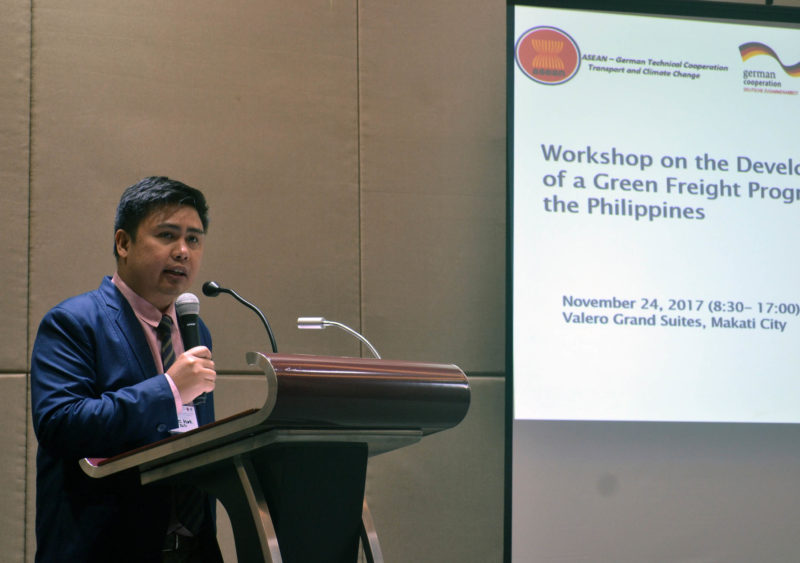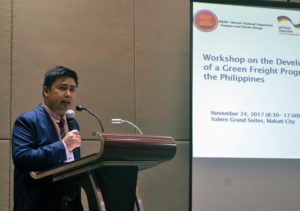

An executive order (EO) designating the Department of Transportation (DOTr) as the Philippines’ competent national body to oversee multimodal transport operators (MTOs) is already being drafted, according to a transport official.
A joint department order (JDO) creating an interagency technical working group for the implementation of the Association of Southeast Asian Nations (ASEAN) Framework Agreement on Multimodal Transport (AFAMT) is also being crafted, DOTr assistant secretary for road transport and infrastructure Mark Richmund de Leon said in a speech during the Green Freight Program Workshop on November 24.
The EO will signal the transfer of accreditation of sea freight forwarders from the Department of Trade and Industry (DTI) to DOTr, which already oversees all other forms of transportation services.
Forming a national accreditation body is required under the AFAMT in order for local MTOs of member nations to be able operate in other ASEAN countries.
Concluded in 2005, this framework agreement has been ratified and is now in force in Cambodia, Myanmar, Thailand, and Vietnam. The Philippines, through the then Department of Transportation and Communications (DOTC), committed to the AFAMT in 2005, but has yet to do the groundwork and institutionalize the agreement.
Stalled transfer
DOTC earlier said that designating the transport department as the single certifying body was hampered by an EO that designated the accreditation of sea freight forwarders to DTI. But in June 2016, DOTr signed a memorandum of agreement (MOA) with DTI allowing for the transfer, and was only just awaiting the trade secretary’s signature. But the MOA was not signed when the Duterte administration took over.
Sea freight forwarders are covered by EO 514 series of 1992, which converted the Philippine Shippers’ Council into the Philippine Shippers’ Bureau (PSB), an agency under DTI. When DTI implemented a rationalization plan in 2014, PSB’s functions were absorbed by the Fair Trade Enforcement Bureau. The supply chain function of PSB was subsequently transferred to the Supply Chain and Logistics Management Division of DTI.
De Leon said that in line with the proposed EO, DOTr is also planning to create an Office for Multimodal Logistics Transport to handle the policies and regulations governing the country’s MTOs.
He noted that in Thailand, an ASEAN peer, some 1,000 to 2,000 personnel have been assigned to its multimodal transport office to focus on logistics policies and intermodal facilities planning.
DOTr’s plans were welcomed by Philippine International Seafreight Forwarders Association (PISFA) chair Ma. Emperatriz Regis, who was also at the seminar. Freight forwarders have for years pushed for the designation of a national certifying body and the transfer of sea freight forwarders under the transport department.
Regis had earlier said that the country would be on the losing end once other ASEAN freight forwarders and logistics providers start to operate in the Philippines, while local MTOs were not permitted to penetrate other ASEAN countries.
According to the National Economic and Development Authority (NEDA), the country, so as to pursue other free trade agreements, especially with Europe, is required to have the capacity to issue single administrative documents which need to be signed by MTOs.
Regis also announced that in line with the AFAMT, local associations PISFA and Aircargo Forwarders Association of the Philippines have integrated into one group, the Philippine Multimodal and Transport Logistics Association or PMTLA. The newly created association has already secured approval from the Securities and Exchange Commission, and will soon be electing its first set of officers.
Launch of logistics masterplan
Aside from finally enforcing and institutionalizing AFAMT, De Leon said DOTr and DTI are set to formally launch next month the country’s first National Logistics Master Plan (NLMP).
De Leon said the plan will set forth a roadmap for the country “to improve logistics performance in a holistic manner.”
He said the master plan specifically intends to enhance trade and investment, connectivity, logistics resiliency, and regional development.
Under the master plan, interventions in terms of infrastructure development, policy framework, regulatory regime, and institution building will be implemented and monitored by the proposed transport infrastructure and trade logistics task force composed of DOTr, DTI, and other partner agencies.
The master plan, spearheaded by DTI, is seen to address issues and concerns that affect the competitiveness of the Philippine logistics industry, including the lack of infrastructure and difficulties arising from regulatory bottlenecks.
During the workshop, it was also suggested to include the NLMP in the National Transport Policy (NTP) adopted by NEDA. The NTP seeks to unify all transport-related projects in the country, and to synchronize decisions and investments of all transport-related agencies, and better coordinate such efforts between the national and local levels. – Photo and text by Roumina Pablo




